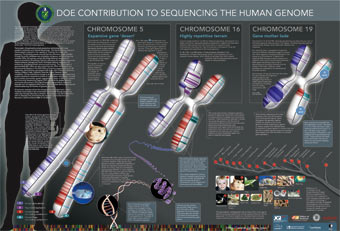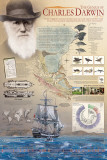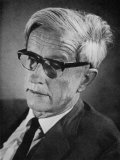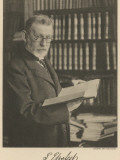|
|
|
|
|
Henrik Dam
b. 2-21-1895; Copenhagen, Denmark
d. 4-17-1976; Copenhagen
Henrik Dam was a physician and biochemist. He was awarded the Nobel Prize in Medicine in 1943 “for his work in discovering vitamin K and its role in human physiology.”
|
|
|
|
Charles Darwin
b. 2-12-1809; The Mount, Shrewsbury, Shropshire, England
d. 4-19-1882; Down House, Downe, Kent, England
Charles Darwin's scientific observations and theory that all species of life evolved over times from a few common ancestors is the foundation of biology.
• more Charles Darwin
|
|
|
|
Richard Dawkins
b. 3-26-1941; Nairobi, Kenya
Richard Dawkins is an evolutionary biologist, ethologist (studies animal behavior), author and advocate of Charles Darwin. He has taught zoology at the University of California at Berkeley and at Oxford University and is now the Charles Simonyi Professor of the Public Understanding of Science at Oxford.
Dawkins introduced the term “meme”, an “idea, behavior or style that spreads from person to person within a culture”, in his 1976 book The Selfish Gene. Genes transmit biological information.
Richard Dawkins quotes ~
• “We are going to die, and that makes us the lucky ones. Most people are never going to die because they are never going to be born. The potential people who could have been here in my place but who will in fact never see the light of day outnumber the sand grains of Arabia. Certainly those unborn ghosts include greater poets than Keats, scientists greater than Newton. We know this because the set of possible people allowed by our DNA so massively exceeds the set of actual people. In the teeth of these stupefying odds it is you and I, in our ordinariness, that are here.”
• “After sleeping through a hundred million centuries we have finally opened our eyes on a sumptuous planet, sparkling with color, bountiful with life. Within decades we must close our eyes again. Isn’t it a noble, an enlightened way of spending our brief time in the sun, to work at understanding the universe and how we have come to wake up in it? This is how I answer when I am asked — as I am surprisingly often — why I bother to get up in the mornings.”
• “I am against religion because it teaches us to be satisfied without understanding the world.” (see Voices of Reason poster)
|
|
|
|
Max Delbrück
b. 9-4-1906; Berlin, Germany
d. 3-9-1981
Delbruck was a biophysicist who made fundamental studies the established modern molecular biology. He shared the Nobel Prize in Physiology or Medicine for 1969 with Salvador Luria and Alfred Hershey.
|
|
|
|
Gertrude Elion
b. 1-23-1918; NYC
d. 2-21-1999; Chapel Hill, NC
Biochemist Gertrude Elion was awarded the 1988 Nobel Prize for Physiology or Medicine in 1988 with James W. Black and George H. Hitchings “for their discoveries of important principles for drug treatment.”
Gertrude Elion quotes ~
• “Don't be afraid of hard work. Nothing worthwhile comes easily. Don't let others discourage you or tell you that you can't do it. In my day I was told women didn't go into chemistry. I saw no reason why we couldn't.”
• “I think it's a very valuable thing for a doctor to learn how to do research, to learn how to approach research, something there isn't time to teach them in medical school. They don't really learn how to approach a problem, and yet diagnosis is a problem; and I think that year spent in research is extremely valuable to them.”
• “It is important to go into work you would like to do. Then it doesn't seem like work. You sometimes feel it's almost too good to be true that someone will pay you for enjoying yourself. I've been very fortunate that my work led to useful drugs for a variety of serious illnesses. The thrill of seeing people get well who might otherwise have died of diseases like leukemia, kidney failure, and herpes virus encephalitis cannot be described in words.”
• “Maybe I was young and 'cute' (after all, I was only twenty then), but I've learned over the years that when you put white lab coats on chemists, they all look alike!”
• “People ask me often [whether] the Nobel Prize [was] the thing you were aiming for all your life, and I say that would be crazy. Nobody would aim for a Nobel Prize because, if you didn't get it, your whole life would be wasted. What we were aiming at was getting people well, and the satisfaction of that is much greater than any prize you can get.”
• “I had fallen in love with a young man..., and we were planning to get married. And then he died of subacute bacterial endocarditis... Two years later with the advent of penicillin, he would have been saved. It reinforced in my mind the importance of scientific discovery...”
• “What greater joy can you have than to know what an impact your work has had on people’s lives? The thrill of seeing people get well who otherwise might have died cannot be described in words.”
• “It’s amazing how much you can accomplish when you don't care who gets the credit.” (also attributed to Harry S Truman)
|
|
|
|
Paul Ehrlich
b. 3-14-1854; Strehlen, Lower Silesia, German Kingdom of Prussia
d. 8-20-1915; Bad Homburg, Hesse (stroke)
Paul Ehrlich, and Ilya Illyich Mechnikova, were awarded the Nobel prize in Physiology and Medicine in 1908 “in recognition of their work on immunity.” Ehrlich is also noted for curing syphilis, coining the term chemotherapy, and popularized the concept of a “magic bullet.”
Paul Ehrlich quotes ~
• “Few problems are less recognized, but more important than, the accelerating disappearance of the earth's biological resources. In pushing other species to extinction, humanity is busy sawing off the limb on which it is perched.”
• “Success in research needs four Gs: Glück, Geduld, Geschick und Geld. Luck, patience, skill and money.”
• “The organism possesses certain contrivances by means of which the immunity reaction, so easily produced by all kinds of cells, is prevented from acting against the organism's own elements and so giving rise to auto toxins ... so that one might be justified in speaking of a 'horror autotoxicus' of the organism. These contrivances are naturally of the highest importance for the existence of the individual.”
* “The Story of Dr. Ehrlich's Magic Bullet” (1940) starring Edward G. Robinson
|
|
|
|
previous page | top | next
biologists list | a-b-c | D-E-F | g-h-i | j-k | L | m-n-o-p | q-r-s | t-u-v | w-x-y-z
|
|
I have searched the web for visual, text, and manipulative curriculum support materials - teaching posters, art prints, maps, charts, calendars, books and educational toys featuring famous people, places and events - to help teachers optimize their valuable time and budget.
Browsing the subject areas at NetPosterWorks.com is a learning experience where educators can plan context rich environments while comparing prices, special discounts, framing options and shipping from educational resources.
Thank you for starting your search for inspirational, motivational, and educational posters and learning materials at NetPosterWorks.com. If you need help please contact us.
|
|
|









